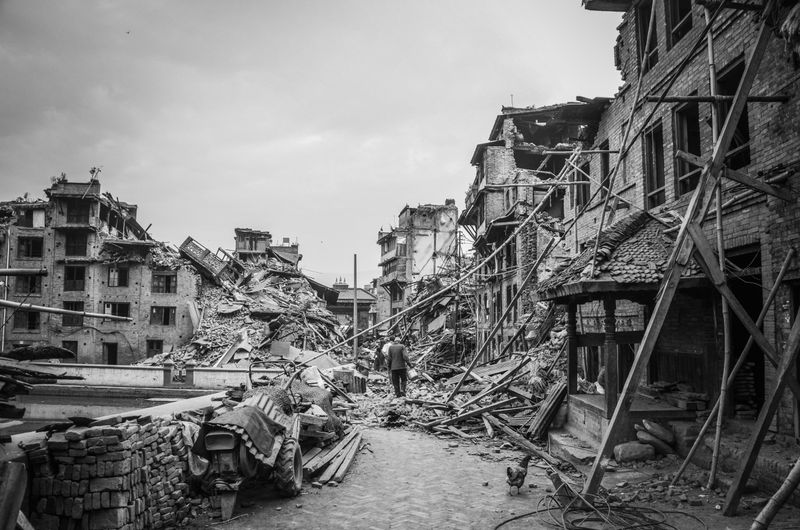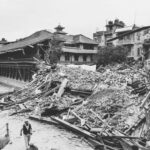Sirens going off: Magnitude 6.0 earthquake hits New Zealand
New Zealand’s earthquake-prone landscape
New Zealand’s South Island experienced a magnitude 6.0 earthquake today, causing alarm and concern among residents. It is not uncommon for New Zealand to be struck by earthquakes due to its location on the Pacific Ring of Fire, where several tectonic plates meet. The occurrence of earthquakes is a stark reminder of the volatile nature of our planet and the forces at play beneath the Earth’s surface.
The impact and response
According to reports, this recent earthquake struck at 9:14 am and was centered approximately 45km north of Geraldine at a depth of 10km. The GeoNet website has recorded over 14,338 reports of people feeling the quake, with the majority coming from the South Island. Fire and Emergency New Zealand has stated that there are no reports of significant damage, which is fortunate considering the potential for destruction that earthquakes of this magnitude can cause.
Civil Defence has confirmed that there is no tsunami risk, providing some relief to New Zealanders who have endured the devastating consequences of past earthquakes, such as the one that struck Christchurch in 2011. That particular earthquake, with a magnitude of 6.3, claimed the lives of 185 people and left the city in ruins. The trauma of that event is still fresh in the minds of many New Zealanders.
The human experience of earthquakes
As reports from eyewitnesses detail, the shaking was felt throughout the South Island. Timaru resident Ferguson Sail was studying earthquakes when the earthquake occurred. He described gripping onto his table for stability as the chairs with wheels moved around the room. The sense of fear and vulnerability that earthquakes evoke is undeniable, as individuals grapple with the unpredictable nature of these natural disasters.
Another witness, a Geraldine resident, recounted the experience of seeing fans in her café shaking and feeling a wavy sensation. The earthquake lasted for at least a minute, a long and disconcerting period for those caught in its grip. It is moments like these that prompt reflection on the fragility of our existence and the importance of preparedness in the face of natural disasters.
Lessons learned
New Zealand has made significant strides in terms of earthquake preparedness and response since the devastating Christchurch earthquake in 2011. Building codes have been updated, infrastructure has been strengthened, and public awareness campaigns have been implemented to better equip communities for potential earthquakes. These efforts are crucial in safeguarding lives and minimizing the impact of future seismic events.
However, earthquakes serve as a reminder that there are limits to our control and preparedness. No amount of regulations or precautions can eliminate the risk entirely. They compel us to ponder the broader questions about our place in the world and our ability to withstand the forces of nature. It is an opportunity to reflect on the transience of human endeavors and the resilience required to rebuild and move forward.
Editorial: The resilience of New Zealanders
New Zealand, with its stunning landscapes and warm-hearted people, has faced its fair share of natural disasters over the years. Earthquakes, in particular, test the resolve and character of a nation. The resilience displayed by the New Zealand people in the face of adversity is nothing short of remarkable.
The Christchurch earthquake in 2011 was a tragedy that shook the nation to its core. Lives were lost, buildings crumbled, and the city was left in ruins. However, the response from the community was one of unity, determination, and sheer grit. Kiwis banded together to support each other, rebuild their city, and emerge stronger than ever. It is a testament to their unwavering spirit and resilience.
As New Zealand faces yet another earthquake, it is important to acknowledge the lessons learned from past experiences. Preparedness, both on an individual and community level, is vital. Knowing how to respond and having emergency plans in place can significantly reduce the potential impact of earthquakes. It is also crucial to support ongoing research and initiatives aimed at improving seismic monitoring and prediction capabilities.
The solidarity and support that New Zealanders demonstrate in the aftermath of such events should inspire communities worldwide. The ability to come together in times of adversity is a hallmark of a strong and cohesive society. It is this spirit that empowers a nation to rebuild, heal, and move forward.
Advice: Be prepared and stay resilient
While earthquakes are unpredictable by nature, it is important for individuals and communities to be prepared. Here are some steps you can take to stay safe during an earthquake:
1. Create an emergency plan
Develop a plan with your family or household members that includes a meeting place, contact information, and an emergency kit with essential supplies such as food, water, and first aid items. Make sure everyone understands the plan and knows what to do in case of an earthquake.
2. Secure your home
Identify and secure heavy furniture, appliances, and other objects that could tip over or cause injury during an earthquake. Securely fasten shelves, cabinets, and heavy items to walls. Securely strap your water heater to prevent it from tipping over and causing damage or injury.
3. Educate yourself
Familiarize yourself with the earthquake risks in your area. Stay informed about local seismic activity and emergency procedures. Understand the difference between a magnitude and intensity, as well as the potential impacts of earthquakes in your region.
4. Stay calm and seek shelter
During an earthquake, move to a safe location away from windows, heavy objects, and tall furniture that could fall. Drop, cover, and hold on to protect yourself from falling debris. If outdoors, move to an open area away from buildings, trees, and power lines.
5. Follow official instructions
Listen to emergency alerts and instructions from local authorities. If evacuation is necessary, follow designated routes and avoid unnecessary risks.
Remember, earthquakes may be unpredictable, but being prepared and staying resilient can make a significant difference. By taking proactive measures and supporting one another, we can navigate these natural disasters with strength and unity. Together, we can weather the shaking ground and emerge stronger on the other side.

<< photo by Sanej Prasad Suwal >>
The image is for illustrative purposes only and does not depict the actual situation.
You might want to read !
- “Shaking Up the Land of the Long White Cloud: Exploring New Zealand’s Resilience in the Face of a Magnitude-6 Earthquake”
- “Jacinda Ardern’s Mysterious Absence: Unraveling the Enigma Behind Her Withdrawal from New Zealand’s Election Campaign”
- “Battle Down Under: New Zealand Triumphs over Namibia in Epic Rugby World Cup Clash”
- Coles Bay Rd Blocked as Bushfire Threatens Community
- “The Showdown in Spain: Catch the Epic La Liga Battle between Barcelona and Real Betis Live!”
- Torrential Rains Ravage Derna: Unprecedented Catastrophe Strikes Libya
- Devastation Down Under: Tragic Loss as Floods Claim over 11,300 Lives in Libya’s Derna
- Bali Sea Shakes: Exploring the Aftermath of a 7.0 Magnitude Earthquake in the Region
- “The Crucial Role of Josh Green in Reconnecting Australia with FIBA World Cup Glory”
- “From Down Under to the Stage: Pink Sets the Australian Tour on Fire”
- Bali Sea Shaken: Assessing the Impact of the Magnitude 7.0 Earthquake




